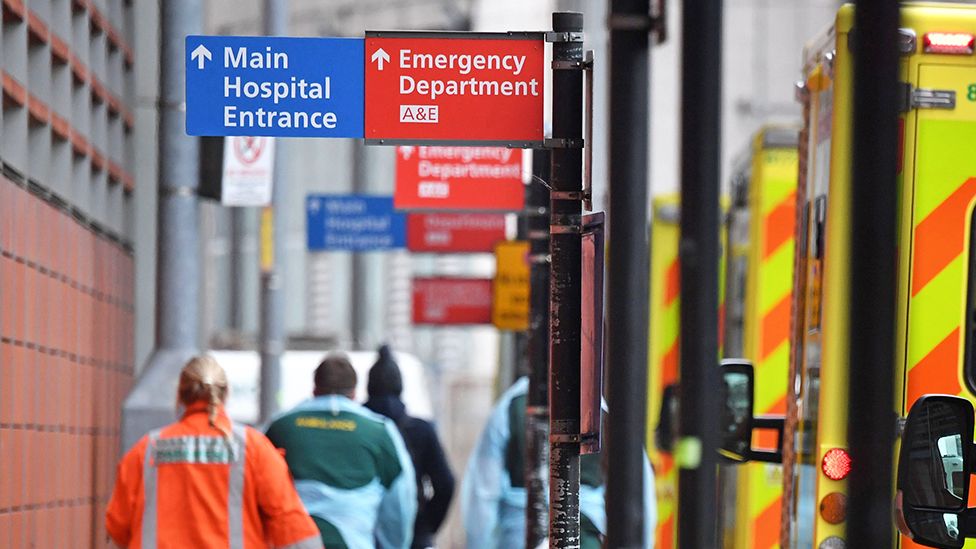The hospitals struggling the most as winter bites
- Published

Dangerous delays for people needing emergency care are putting them at risk, the ambulance service is warning.
Overcrowding on wards means patients face long waits in A&E - with growing numbers of those arriving by ambulances being stuck in queues outside.
It should only take 15 minutes for patients brought in by ambulance to be handed over to A&E staff.
But last week, at some hospital trusts, more than 80% waited longer than 30 minutes, NHS data for England shows.
Ambulance service leaders said these delays put patients at risk of harm - and delayed them answering other emergency calls.
NHS England acknowledged the system was under "considerable strain", but said extra staff had been recruited and beds opened, leaving the health service in a better position than this time last year.
Alongside the data on handover times, figures released on Thursday showed:
30% of patients waited longer than the target time of four hours in A&E in November
Average response times of more than 38 minutes for category two emergency calls such as heart attacks and strokes - above the target time of 18 minutes
Both measures are a slight improvement on this time last year, which ended up being the worst winter since records began 20 years ago.
The figures have been published as the BBC launches its winter NHS tracker, which allows people to find out how their local services are performing wherever they live in the UK.
'Severe impact'
However, the deteriorating situation with handover times which are more up-to-date - for the week ending 10 December - suggests performance may get worse as winter progresses.
More than a third of ambulances waited longer than 30 minutes when they arrived at A&E last week - up from just above a quarter the week before.
While the data only covers England, the Association of Ambulance Chief Executives (AACE) said it was a problem all parts of the UK were facing.
AACE managing director Anna Parry said the delays with handover times were "concerning".
She said they had a particularly "severe impact" on the ability of the ambulance service to respond quickly to category two emergency calls.
Richard Webber, of the College of Paramedics, said his members had started to see longer delays developing in recent weeks with waits of more than four hours "not unusual".
"Every day we are hearing of crews stuck outside A&E that long - some of the big hospitals can have 15 to 20 ambulances outside at times.
"It is really frustrating as we know there are patients in the community who need our help but we cannot get to them."
The warnings come just weeks after the senior coroner in Cornwall, Andrew Cox, wrote to Health Secretary Victoria Atkins, urging her to take action over the delays ambulance crews were facing.
He said he had overseen three inquests into deaths where the problems were a factor, but said these were "not isolated cases" - adding future deaths will occur unless action is taken.
'Patients waiting hours to be seen'
BBC health correspondent Sharon Barbour at Cumberland Infirmary
In the foothills of the Lake District, the Cumberland Infirmary is the largest hospital in Cumbria. But it is not big enough. It is already full.
There are no more beds on wards. There is no more room in A&E - with about 50 patients waiting to be seen. Some patients have waited up to 30 hours for a bed.
We met one patient who had been brought in the night before. She had spent two hours waiting in an ambulance and 14 hours sitting in A&E - but the staff, she says, "had been excellent".
As we filmed, seven ambulances were outside. Paramedics are held up here caring for their patients - some in the back of ambulances.
Health bosses here in Carlisle say they are doing their best, but they are struggling to free up beds because it is so difficult to discharge patients because of the lack of support in the community.
NHS England medical director Prof Sir Stephen Powis admitted the emergency care system was under "considerable strain".
But he praised staff for continuing to "pull out all the stops" to deliver for patients - and also pointed out the waiting list for routine care had dropped from 7.77 million to 7.71 million in October.
"While the sheer amount of care being delivered for patients by our staff is incredible, we know we still face a challenging winter on a number of fronts, with the number of patients in hospital with flu and norovirus increasing considerably each week, continued issues discharging patients and another period of industrial action," he said.
Next week junior doctors will stage a three-day strike, followed by a six-day strike at the start of January, the longest walkout in NHS history.
Siva Anandaciva, chief analyst at The King's Fund think tank, said: "Last winter was one of the most challenging periods in the recent history of the NHS.
"Today's performance data suggests the NHS and patients will again be facing a winter of record pressure."
Additional analysis by Aidan McNamee and Harriet Agerholm
Have you experienced a long wait for an ambulance, a bed on a ward or in A&E? Share your experiences by emailing haveyoursay@bbc.co.uk, external.
Please include a contact number if you are willing to speak to a BBC journalist. You can also get in touch in the following ways:
WhatsApp: +44 7756 165803
Tweet: @BBC_HaveYourSay, external
Please read our terms & conditions and privacy policy
If you are reading this page and can't see the form you will need to visit the mobile version of the BBC website to submit your question or comment or you can email us at HaveYourSay@bbc.co.uk, external. Please include your name, age and location with any submission.
Related Topics
- Published25 May 2023
